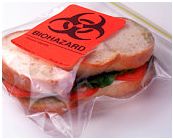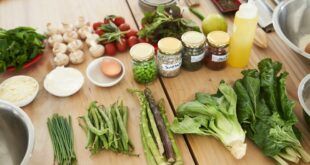Food poisoning is initiated when you consume contaminated food or other bacterial affected food. Your symptoms may range from upset stomach to diarrhoea, fever, vomiting, abdominal cramps and dehydration. Most such infections go undiagnosed and unreported.
So what are the symptoms?
 About 20 organisms can produce food poisoning. Once you eat the food which is contaminated by bacteria, you can find the uneasiness in the stomach. All the bacteria in the stomach will multiply when bacteria gives off toxins. As a result, nausea, vomiting, abdominal cramps and diarrhoea occur. Vomiting and diarrhoea are the body's way of eliminating the poison, and most cases of food poisoning run their course without needing medical attention.
About 20 organisms can produce food poisoning. Once you eat the food which is contaminated by bacteria, you can find the uneasiness in the stomach. All the bacteria in the stomach will multiply when bacteria gives off toxins. As a result, nausea, vomiting, abdominal cramps and diarrhoea occur. Vomiting and diarrhoea are the body's way of eliminating the poison, and most cases of food poisoning run their course without needing medical attention.
The symptoms may vary form case to case but the majority standard symptoms are vomiting. However symptoms may also include fevers and chills, be as non descript as weakness and exhaustion
Common Sources of Food Poisoning
Campylobacter is the primary cause of bacterial food poisoning. It causes numerous cases a year, even resulting in deaths. The food poisoning is caused because of eating undercooked chicken or the food in contact with raw chicken. The Centre for Disease Control estimates that up to 70%-90% of chickens are infected with campylobacter.
Food Poisoning- Preventive steps
 Make sure that the chicken is cooked well. When meat is uncooked or undercooked, there can be a lot of distinct kinds of bacteria which can still grow. Some of these might make you sick right away by interacting with cells that make up your stomach. Other bacteria will just keep growing on your meat and make toxins which will make you sick. The under cooked meat or chicken is very risky to the health. The meet, which is cooked well or even over cooked may not cause any harm to health as the bacteria will be killed in the over cooked chicken. Also, when you cook your meat properly, you can refrigerate it securely for longer than undercooked meat.
Make sure that the chicken is cooked well. When meat is uncooked or undercooked, there can be a lot of distinct kinds of bacteria which can still grow. Some of these might make you sick right away by interacting with cells that make up your stomach. Other bacteria will just keep growing on your meat and make toxins which will make you sick. The under cooked meat or chicken is very risky to the health. The meet, which is cooked well or even over cooked may not cause any harm to health as the bacteria will be killed in the over cooked chicken. Also, when you cook your meat properly, you can refrigerate it securely for longer than undercooked meat.
Temperature: Keeping foods at the proper temperature-especially dairy, eggs, and meats-is very important. To appropriately store foods, keep your freezer set to zero degrees Fahrenheit and your fridge set 37 to 40 degrees.
Eating hygiene food can diminish the probability of causing food poisoning. Be smart about your healthiness and take the required precautions when working with food.
Summary of Food Poisoning
All the symptoms like nausea, vomiting, abdominal cramps and diarrhoea are not true cases of Food poisoning. An exact diagnosis can be intractable because the pathogenic organisms are found in dissimilar kinds of food and have unreliable incubation periods. Also, eating a substance and getting sick straight away afterwards is not the normal course for food poisoning. Most people are not concerned that food eaten several days formerly can be the cause of food poisoning. Always be sure to consult a physician when experiencing terrible gastrointestinal symptoms.
Courtesy of FoodPoisoning.com










buzzyBee15626 - 14 years ago
While I agree with most of the above, I have a real problem with the following:
“Temperature: Keeping foods at the proper temperature-especially dairy, eggs, and meats-is very important. To appropriately store foods, keep your freezer set to zero degrees Fahrenheit and your fridge set 37 to 40 degrees”.
Who, but the very old, remember Fahrenheit? Let alone, what fridge/freezer is set to that these days???
I’m starting to lose faith in this website… if it willy-nilly copies stuff from America without checking accuracy!